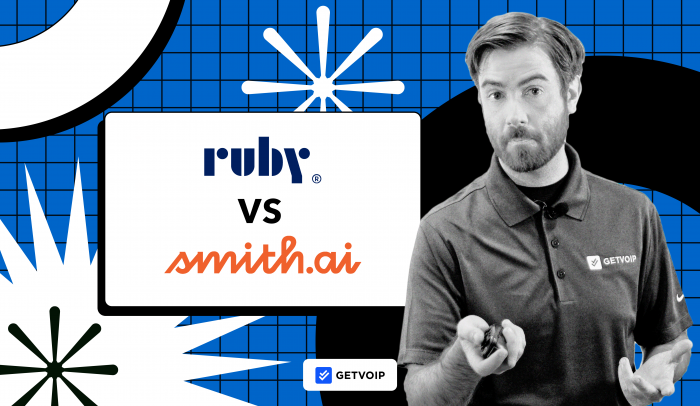Verdict: Ruby and Smith.ai are two of the most popular software platforms for outsourcing client communication including phone answering and web chat. Ruby is a virtual receptionist service that provides 24/7 live human agents trained in the United States, while Smith.ai is an AI-first platform that allows companies to build custom AI Receptionists with 24/7 live human backup.
Although Ruby’s focus is on human agents, the platform also relies heavily on AI to provide agents with the information they need about the customers they are speaking with and the company’s operations.
Ruby’s human agents are able to handle more complex calls and offer that essential “human touch”, but they are more costly. On the other hand, Smith.ai is capable of automating many receptionist tasks such as FAQs, call transfer, appointment booking, etc. to relieve stress on live agents and cut costs.
In the paragraphs below we will take a closer look at these two platforms when it comes to pricing, call handling, analytics, and more.
- Comparison Methodology
- At a Glance
- Direct Comparison
- Pricing and Plans
- Pros and Cons
- Which to Choose?
How We Compared Smith.ai and Ruby
Our team spent some time exploring both Smith.ai and Ruby platforms to determine how they compared to one another as well as other competing AI receptionists. Here are some of the factors we considered:
- Pricing + Plans: We looked at the various pricing plans each platform offered and what was included to determine overall value
- User Experience: We tested the user experience by diving into advanced features, making customizations, and exploring integrations and the mobile app
- Reliability + Security: We reviewed call quality and security features such as data encryption, authentication, and compliance certifications
- Call Handling Features: We compared call handling features such as transfers, summaries, FAQ answers, etc.
- Reporting + Analytics: We evaluated the reporting and analytics capabilities such as customizable reporting templates, alerts, charts, heat maps, etc.
- Integrations: We determined what integrations were available at each price point and whether they were out-of-the-box or required a third party “middle man” such as Zapier/make
- Customer Support: We compared customer support availability and determined efficacy through our own tests as well as reading user reviews
Smith.ai vs Ruby: At a Glance
Ruby and Smith.ai both offer receptionists that can take calls, answer questions, and handle transfers, but Ruby provides a more straightforward customer intake process while Smith.ai focuses more on lead management and qualification. Here’s a quick glance at the two providers.
| Smith.ai | Ruby | |
| Pricing | 4 plans from $95 to $800+ per month | 4 plans from $245 to $1,695 per month |
| Top Features |
|
|
| Languages | English and Spanish | English and Spanish |
| Integrations | Agile, Hubspot, Keap, etc. | Zapier, Clio, Rocket Matter, etc. |
| Reporting and Analytics | Summary notes, line by line transcript, call recordings, pie charts and bar graphs | Transcripts and instant notifications, visual graphs |
| Customer Support | 24/7 live agents, knowledge base, etc. | Live receptionists available Mon-Fri 5am-6pm PST |
| Best For | SMBs and sales teams | Professional services and healthcare industry |
Smith.ai vs Ruby: Direct Comparison
Smith.ai and Ruby both help companies provide empathetic customer service around the clock without hiring extra agents, but there are some key differences between the two platforms. Let’s take a look at how Ruby and Smith.ai compare when it comes to call handling, customization, analytics, integrations, and more.
Call Handling Capabilities
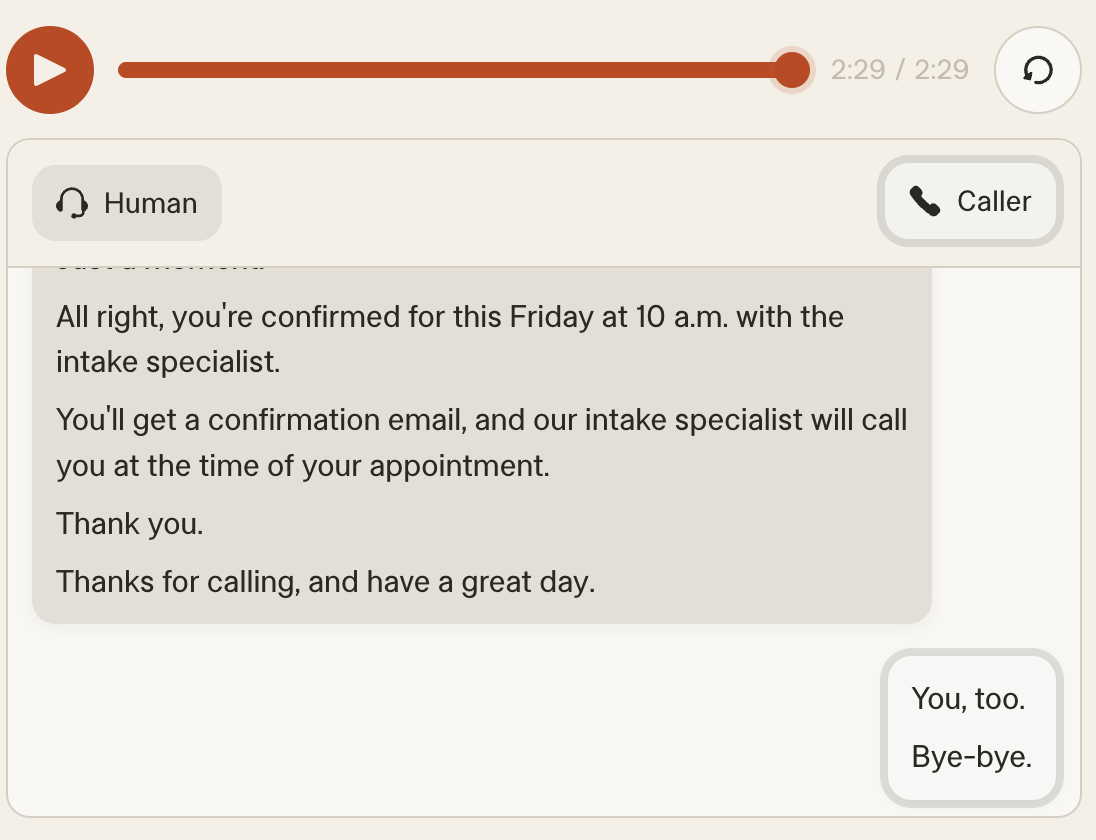
Ruby and Smith.ai both provide 24/7 availability, simultaneous call handling, FAQ answering, instant summaries, outbound calling, and bilingual support but as Ruby uses actual human agents it has more natural sounding fluctuations in speed and intonation than Smith.ai.
Ruby uses a system known as IRIS (Integrated Ruby Information System) which allows the human receptionists to access key details about employee availability, client data, and geographic information such as the weather report in the city where the caller is located. Ruby provides an instant notification after each call with a summary of the call and next steps.
Smith.ai allows admins to create a custom call handling playbook for each type of caller such as qualified leads, existing customers, unknown callers etc.
Human Support & Escalation
Both providers offer human backup availability, call transfer capabilities, and after-hours coverage. Both Ruby and Smith.ai can handle basic calls with common questions and concerns, but Ruby’s receptionists are able to handle any kind of calls using information provided by the company, while Smith.ai relies more on separate human backup for complex calls.
Smith.ai admins set up call transfer rules that guide the AI receptionist to conduct intake and then initiate a warm transfer to a live agent if necessary, with 24/7 North American based and industry trained human backup available if the call is after hours.
Ruby AI receptionists will also transfer calls based on preferences and can determine where a call should be transferred based on key topics or questions that are brought up. Because Ruby uses live human receptionists trained in the US exclusively, there is no need for backup.
Lead Management & Qualification
Both platforms offer lead screening and qualification capabilities, CRM integration with data capture and automatic updates, and follow-up summaries, but Smith.ai offers these services using strictly AI and automation technology while Ruby uses a combination of live agents, CRM integrations, and AI-powered call coaching and screen displays.
Smith.ai provides automated lead qualification using pre-determined intake questions submitted by the company. Once a lead is qualified, the AI Receptionist can prompt the caller to book a service or transfer to a member of the sales team.
Smith.ai may provide more consistent lead qualification but Ruby human receptionists are better at picking up on subtle nuances in callers.
Appointment Scheduling
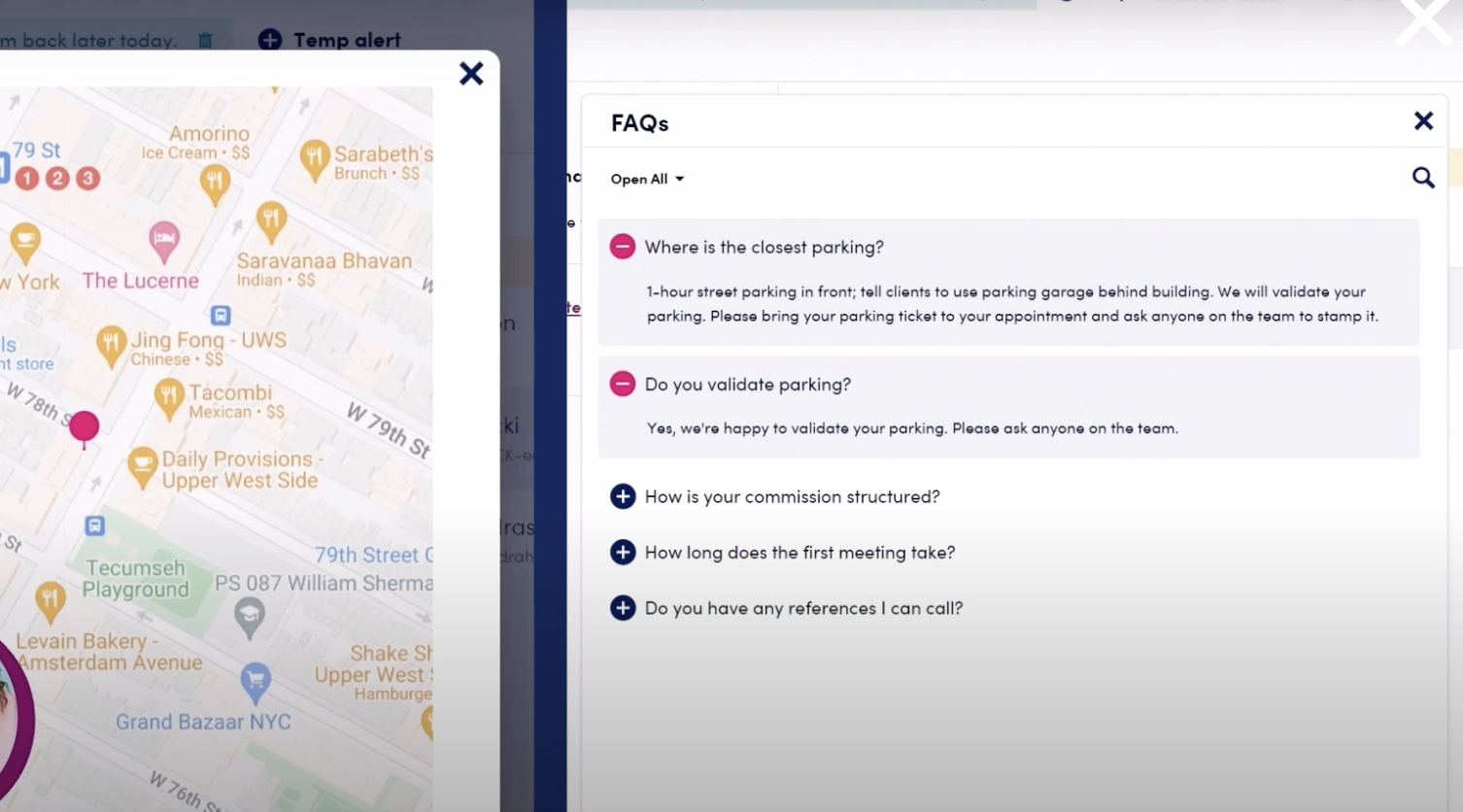
Ruby and Smith.ai both offer calendar integration options with 24/7 booking flexibility, confirmation and reminders, and rescheduling capabilities but Smith.ai has a larger selection of integrations.
Ruby receptionists schedule appointments for companies around the clock using one of its 20 pre-approved calendar integrations such as Calendly, Square, and Setmore.
Smith.ai AI Receptionists take calls and book appointments automatically using calendar integrations such as Appointy, Clio, and Google. Follow-up reminders are scheduled immediately and sent out automatically at the appropriate time. For more complex appointment scheduling, calls are forwarded to a rep at the company or at Smith.ai.
Call Intelligence & AI Customization
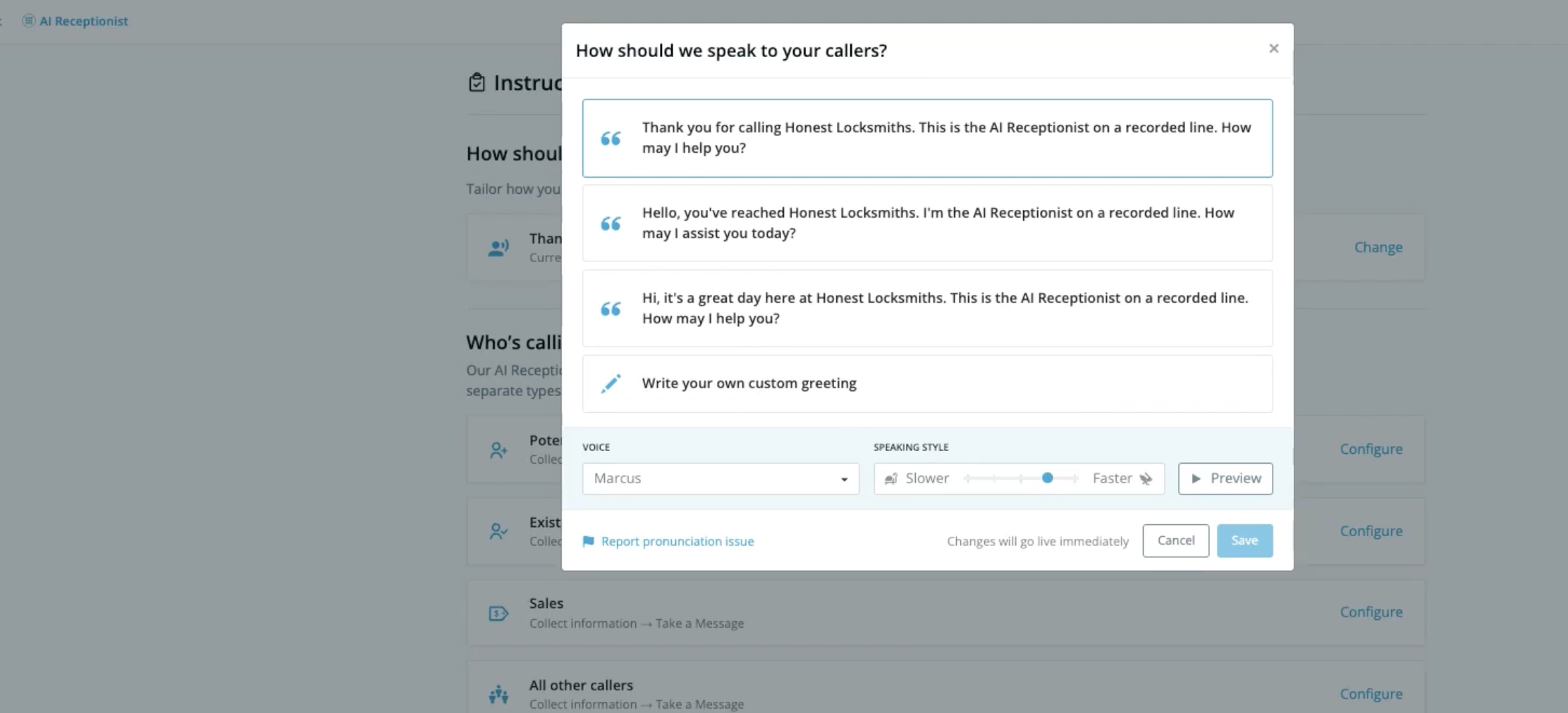
Both providers are able to offer FAQ answering and custom scripting, but Ruby’s answers and responses are more accurate particularly with more complex calls. Smith.ai ‘s AI receptionists leverage machine learning so that they improve in accuracy over time, but as Ruby utilizes live humans, they are also able to adapt quickly as more data comes in.
While Smith.ai users can select the gender, speed and personality of each AI receptionist, Ruby does not offer this level of customization.
Analytics & Reporting
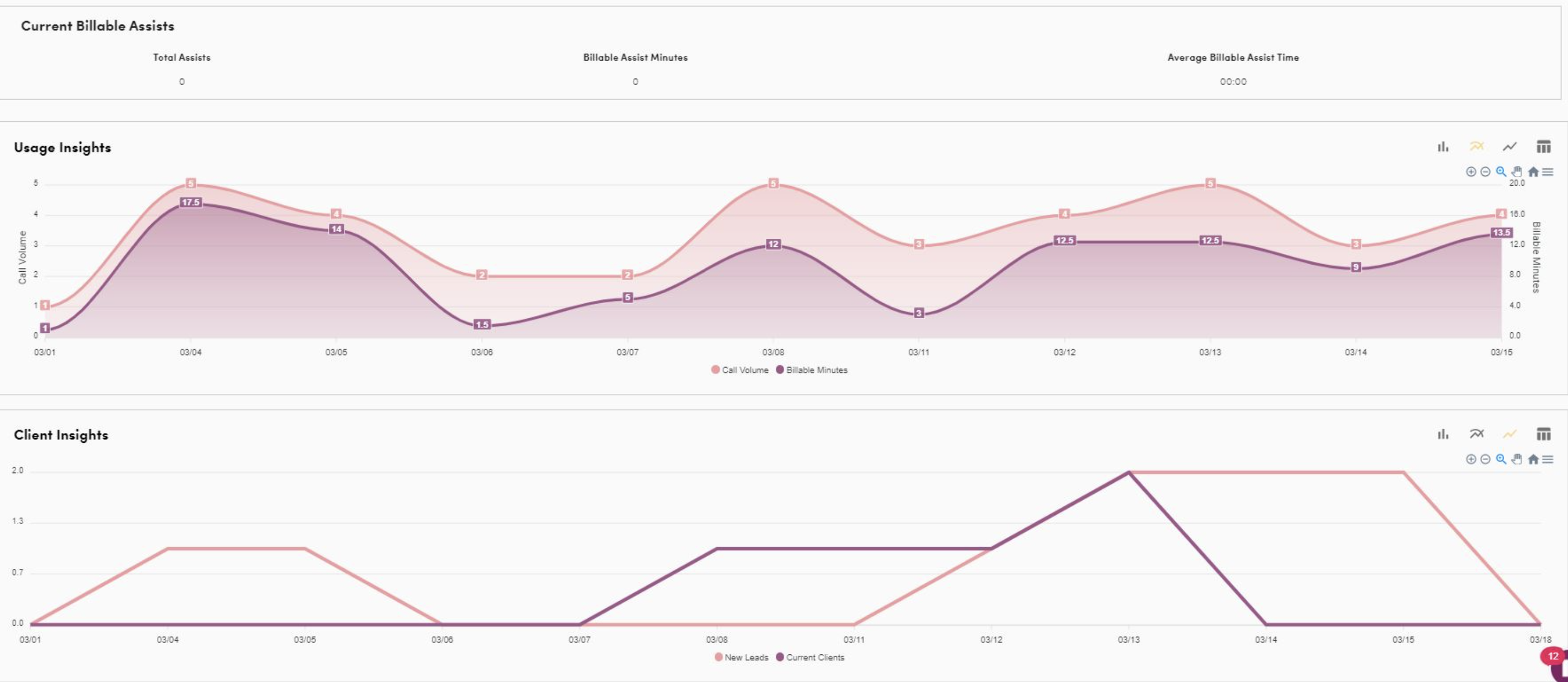
Both Ruby and Smith.ai provide call logs showing companies who is calling and how often, as well as key data on each caller such as the disposition, call type, and priority. Both providers also send automated summaries and call transcripts, but only Smith.ai also sends a call recording.
Both platforms offer customizable analytics dashboards with graphs and charts showing usage broken down by time period or phone numbers. Reports can be exported as a PDF, CSV, or Excel document.
Integrations
Ruby integrates with dozens of calendar apps, CRMs such as Salesforce and Clio, marketing automation tools like Hubspot, Keap, and Zoho, and team collaboration apps such as Slack and Microsoft Teams. Ruby also offers some niche, industry-specific integrations such as 8am MyCase and Lawmatics, as well as project management integrations like monday. Smith.ai offers all of these integrations along with hundreds of others.
Both platforms allow users to build virtually any integration via Zapier, but only Smith.ai also offers a Zapier Make integration.
Smith.ai vs Ruby: Pricing and Plans
Ruby is pricier than Smith.ai and includes less minutes each month. Additionally, Ruby charges extra for live chat bundles while Smith.ai includes 24/7 live chat in its plans. On the other hand, Ruby offers a higher level of security including HIPAA compliance as well as that irreplaceable human touch on all calls.
Smith.ai Pricing
Smith.ai offers four bundled plans ranging from $95 to over $800 per month. Plans limit the number of included calls. For example, the Starter plan includes 50 calls per month while the Pro plan includes 500 calls per month. Overage costs are $2.40 per call.
Custom plans are also available. All plans include a 30 day money back guarantee.
Ruby Pricing
Ruby also offers four bundled plans but prices start at $245 and go up to $1,695 per month. The number of included minutes ranges from 50 minutes per month in the first tier plan to 500 minutes per month in the highest tier.
Ruby also offers Live Chat plans ranging from $140 to $510 per month and chat bundles that can be added on to AI receptionist plans ranging from $112 per month for 10 chats per month to $408 per month for 50 chats per month. Ruby also offers custom plans.
Pros and Cons of Smith.ai and Ruby
Ruby is more expensive than Smith.ai but provides live human agents that can handle almost anything with training in empathy and other soft skills. Smith.ai excels at common queries, appointment scheduling, and other necessary, but tedious tasks. Here are some pros and cons of each platform.
Smith.ai Pros
- Lead qualification: Smith.ai is one of the best AI receptionist when it comes to lead qualification with many customization options
- Client intake: Smith.ai admins can customize client intake questions and the AI receptionist will insure that intake is compliant and consistent
- Affordable: Smith.ai has plans starting at only $95 per month which is much more affordable than competitors like Ruby
Smith.ai Cons
- Relies heavily on AI: Although Smith.ai does offer live human agent backup, it is an AI first company
- Learning curve: As Smith.ai relies on AI receptionists there is more involved with initial setup and admins will have to keep a close eye on communications
- Personalization: Smith.ai does offer some personality customizations for AI Receptionists but not as many as other competitors
Ruby Pros
- VIP call lists: Only Ruby offers a VIP call list feature which ensures that important customers will be forwarded to the best representative at the company
- Human touch: Ruby leverages AI to assist human agents that are trained to build relationships and make customers feel special
- HIPAA compliance: Ruby is HIPAA compliant making it a great option for healthcare industry businesses
Ruby Cons
- Expensive: Ruby is more expensive than many competitors with plans starting at $245 per month for only 50 minutes per month
- Live Chat: Ruby has a great live chat offering but it must be purchased separately from phone answering service bundles
- Call recording: Ruby only provides transcription but not call recordings to users
Which AI Receptionist is Right for Your Business?
In general, Smith.ai is best for companies that have a high call volume and a lot of tedious, repetitive tasks such as intake, scheduling, and follow-up. Ruby is the better choice for companies that need that human element. Here’s a look at what types of businesses will benefit most from each platform.
- Best for Small Businesses: Smith.ai can help small businesses cut costs by automating call answering and transfers
- Best for Professional Services: Ruby helps professional businesses that rely on a more intimate relationship with clients such as law firms
- Best for High Call Volume: Smith.ai helps businesses reduce wait times significantly by automating common questions and processes
- Best for Healthcare: Ruby is a great choice for healthcare professionals as it is HIPAA compliant and trains agents to deal with sensitive patient information
Is There A Clear Winner?
It is difficult to determine a clear winner between Smith.ai and Ruby because they are very different services. While they both allow companies to offload communication services relieving stress on agents and reducing wait times, Smith.ai does this mainly through AI-powered automation while Ruby uses highly skilled human agents.
At the end of the day, the best option for your business depends on how hands on your agents need to be. If you receive a lot of repetitive requests and questions, Smith.ai is the better platform as it can easily handle tasks like this, saving you money and allowing your agents to focus on more complex issues.
On the other hand, if most of your incoming calls and texts involve complex issues and your primary goal is improving CX, Ruby is the gold standard for live human agents that will stay consistent to your company’s values and branding.

